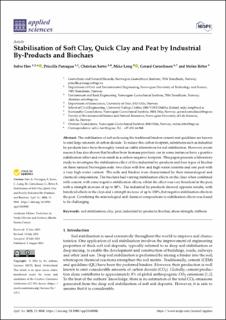Stabilisation of Soft Clay, Quick Clay and Peat by Industrial By-Products and Biochars
Journal article
Published version

View/
Date
2023Metadata
Show full item recordCollections
- NGI articles [1033]
Original version
Appl. Sci. 2023, 13(16), 9048; https://doi.org/10.3390/app13169048Abstract
The stabilisation of soft soils using the traditional binders cement and quicklime are known to emit large amounts of carbon dioxide. To reduce this carbon footprint, substitutes such as industrial by-products have been thoroughly tested as viable alternatives for soil stabilisation. However, recent research has also shown that biochar from biomass pyrolysis can in some instances have a positive stabilisation effect and even result in a carbon-negative footprint. This paper presents a laboratory study to investigate the stabilisation effect of five industrial by-products and four types of biochar on three natural Norwegian soils: two clays with low and high water contents and one peat with a very high water content. The soils and binders were characterised by their mineralogical and chemical compositions. The biochars had varying stabilisation effects on the clays when combined with cement, with some negative stabilisation effects, whilst the effect was very beneficial in the peat, with a strength increase of up to 80%. The industrial by-products showed opposite results, with beneficial effects in the clays and a strength increase of up to 150%, but negative stabilisation effects in the peat. Correlating the mineralogical and chemical compositions to stabilisation effects was found to be challenging.
